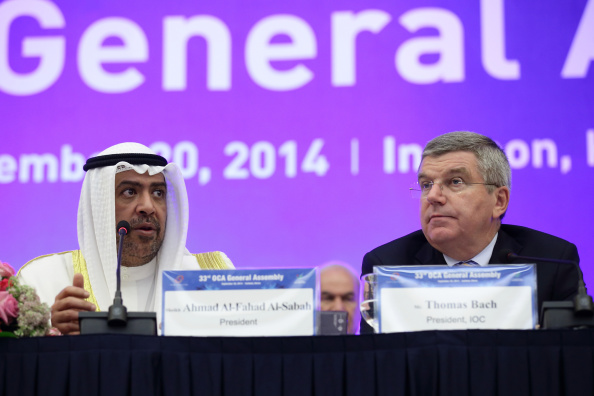At long last, the secret that really is no secret is finally out: sports and politics do mix. The president of the International Olympic Committee, Thomas Bach, said so, in a speech over the weekend at the Asian Games in Incheon, South Korea. If it is a mystery why it took so long for the IOC president, any IOC president, to articulate the obvious, this IOC president deserves full credit for not just recognizing reality but standing ready to build on it.
Sport needs to acknowledge its relationship to politics and business, Bach said. At the same time, he said, the world’s political and corporate elite must be mindful of the autonomy of sports organizations or run the risk of diminishing the positive influence that sport can carry.
“In the past,” Bach said, “some have said that sport has nothing to do with politics, or they have said that sport has nothing to do with money or business. And this is just an attitude which is wrong and which we can not afford anymore.
“We are living in the middle of society and that means we have to partner up with the politicians who run this world.”
This is as far from radical as saying that dollar bills are green.
And yet — there has been this fiction that the Olympic movement is, somehow, some way, supposed to be divorced from politics.
As if.
Now we can do away with this fiction, too — just like the one that the Olympics are for amateur athletes. If you think that LeBron James is an amateur, I have a bridge in Brooklyn I’d like to sell you.
Juan Antonio Samaranch saw to the end of the amateur era.
Now Thomas Bach is making it clear to everyone — at least anyone who wants to listen — that, indeed, sports and politics really do mix.
Of course they mix.
The world is full of politics.
We all live in the real world.
Perhaps this fiction goes all the way back to Avery Brundage — like he is supposed to be some great role model — declaring that sport and politics should be kept apart. (Query: would the record suggest that was the case during his years atop the IOC?)
In any event, everyone knows — has always known — that sport is and always has been intertwined with the world in which it moves.
The examples are far, far, far too numerous to list, everything from the political protests and more in Mexico City in 1968 to the terror attacks in Munich in 1972 to Cathy Freeman amid the ring of fire and water in Sydney in 2000 to the hushed silence of the 9/11 flag at the opening ceremony in Salt Lake City in 2002 to the beating of the drums at the opening ceremony in Beijing in 2008, and on and on and on.
Of course, every edition of the Games — which transpires after frantic bidding contests involving multiple countries — involves layers of relationship between entities. All of that is entirely, wholly political.
The issue amid all of this is, and always has been — always will be — how to draw appropriate boundaries.
This theme — establishing it, defining it — has been one of the primary hallmarks of Bach’s first year in office as he and the IOC head now toward the all-members session in December amid the review and potential reform of the “Agenda 2020” process.
Bach has met with 81 heads of state and government. He has developed what seems to be a special relationship with United Nations Secretary General Ban Ki- Moon, in Incheon calling Ban a “great friend of the Olympic movement … with whom we really enjoy an outstanding partnership and relationship.”
The IOC and UN in April signed an agreement to explore ways to work together. Ban attended both the Sochi Games in February and last month’s Nanjing Youth Games.
In July, with Ban on hand, Bach officially opened the “Sport for Hope” community center in Haiti.
In Sochi, meanwhile, Bach — apparently motivated by President Obama and other politicians who took positions against the Russian law banning gay “propaganda” against minors — said the Olympics should not be “used as a stage for political dissent or for trying to score points in internal or external political contests.”
Bach also said, “Have the courage to address your disagreements in a peaceful, direct political dialogue and not on the backs of the athletes.”
Last November, at the UN, he delivered a speech in which he said the IOC is, itself, not a government. It is, above all, a sports organization — one that seeks to “use the power of our values and symbols to promote the positive, peaceful development of global society.”
He also said that it “must always be clear in the relationship between sport and politics that the role of sport is always to build bridges,” adding, “It is never to build walls.”
Woven throughout that speed were references — as in Saturday’s address in Incheon — to autonomy. That is, the IOC wants sports bodies to be free of governmental interference.
Bach said last November that sport is the “only area of human existence” that has achieved what in political philosophy is known as “universal law” and in moral philosophy as a “global ethic.”
To repeat the example: if you go anywhere in the world and throw down a soccer ball, everyone knows the rules.
Saturday in Incheon, he said, allowing countries to set their own rules for a soccer game would mean that “international sport is over.”
“So we need this worldwide application of our rules to ensure also in the future that sport remains this international phenomenon — which only sport can offer.”



